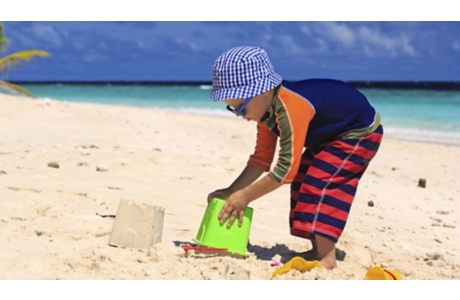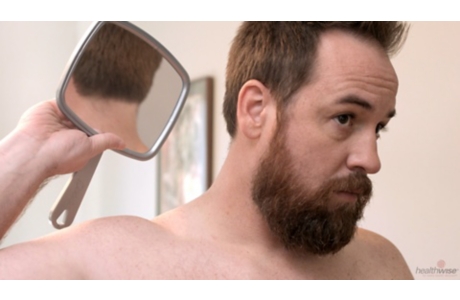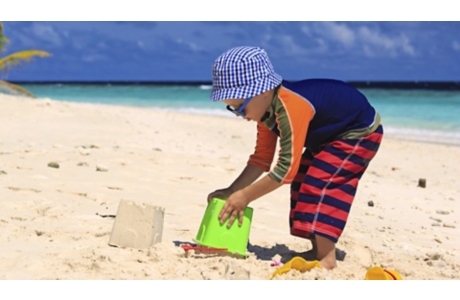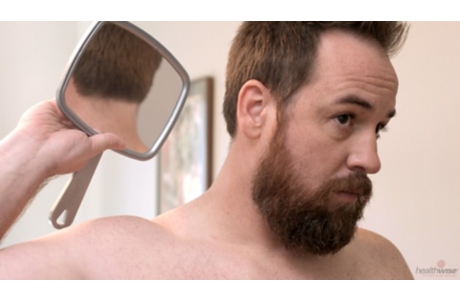Protecting Your Skin From the Sun
Overview
Use the following tips to protect your skin from the sun. You may decrease your chances of getting skin cancer and help prevent wrinkles.
People with darker skin don't sunburn as easily. But they can still get skin cancer. It's important to use sun protection, no matter what color your skin is.
- Stay out of the sun during the peak hours of UV radiation, Opens dialog.
Peak hours are from 10 a.m. to 4 p.m. Find shade if you need to be outdoors. You can also find how much UV exposure you are getting by using the shadow rule. If your shadow is longer than you, then UV exposure is low. If your shadow is shorter than you, then UV exposure is high.
- Wear protective clothing.
This can include:
- Wide-brimmed hats that protect the face and neck.
- Tightly-woven clothes made of thick material, such as unbleached cotton, polyester, wool, or silk.
- Dark clothes with dyes added that help absorb UV radiation.
- Loose-fitting long-sleeved clothes that cover as much of the skin as possible.
- Clothes with sun protection factor (SPF), Opens dialog in the fabric that doesn't wash out.
- Wear sunscreen, with an SPF of 30 or higher, every day.
This includes summer and winter, on both cloudy and clear days.
- Use sunscreen that blocks both UVA and UVB radiation.
Apply to all exposed skin, including the nose, lips, ears, scalp, back of the hands, and neck. Apply sunscreen 30 minutes before going in the sun, and reapply it every 2 hours and after swimming, exercising, or sweating.
- Use protective lip balm.
Use lip balm or cream that has an SPF of 30 or higher to protect your lips from getting sunburned.
- Wear wraparound sunglasses.
Choose ones that block at least 99% of UVA and UVB radiation.
- Be careful when you are on sand, snow, or water.
These surfaces can reflect 85% of the sun's rays.
- Avoid artificial sources of UVA radiation.
This includes sunlamps and tanning booths. Like the sun, they can cause skin damage and increase the risk of skin cancer.
Choosing a sunscreen
If you can't avoid being in the sun, use a sunscreen to help protect your skin while you are in the sun. Sunscreens come in lotions, gels, creams, ointments, and sprays.
Here's how to choose the right sunscreen.
- Read the sunscreen label.
- Be sure that the sunscreen has a sun protection factor (SPF), Opens dialog of at least 30 or higher.
- Be sure that the sunscreen is "broad-spectrum." This type of sunscreen protects the skin from ultraviolet, Opens dialog A and B (UVA and UVB) rays.
- Check the expiration date on the sunscreen. Do not use the sunscreen after its expiration date. The ingredients in the sunscreen may not work as they should after that date.
- Follow the directions on the label for applying the sunscreen. Doing so will make sure that the sunscreen works well to protect your skin from the sun's ultraviolet rays.
- Consider your situation.
- If your skin is sensitive to skin products or you've had a skin reaction (allergic reaction) to a sunscreen, use a sunscreen that is free of chemicals, para-aminobenzoic acid (PABA), preservatives, perfumes, and alcohol.
- If you're going to have high exposure to the sun, consider using a physical sunscreen. These sunscreens, such as zinc oxide, will stop most of the sunlight from reaching the skin. They are usually thick white or colored cream. They prevent the skin from being exposed to the sun's ultraviolet rays. They are useful for high-risk areas such as the nose, lips, and shoulders.
- If you need to use sunscreen and insect repellent with DEET, don't use a product that combines the two. You can apply sunscreen first and then apply the insect repellent with DEET. But the sunscreen must be reapplied every 2 hours.
- If you are going swimming or you sweat a lot, use a sunscreen labeled "water-resistant." The label will say if the sunscreen will protect you for 40 minutes or 80 minutes.
- Use lip balm or cream that has an SPF of 30 or higher to protect your lips from getting sunburned.
Preventing sun exposure in children
Start protecting your child from the sun when your child is a baby. Because children spend a lot of time outdoors playing, they get most of their lifetime sun exposure in their first 18 years.
- Keep babies younger than 6 months out of the sun.
This is the safest thing to do for young babies. Children 6 months and older can go in the sun, but they should have their skin protected from too much sun exposure.
- Teach children how to protect their skin from the sun.
Use the "ABCs" to do this. These are:
- A = Away.
Stay away from the sun as much as possible from 10 in the morning until 4 in the afternoon. Find shade if you need to be outdoors.
- B = Block.
Use a sunscreen with a sun protection factor (SPF), Opens dialog of 30 or higher to protect babies' and children's very sensitive skin.
- C = Cover up.
Have your child wear clothing that covers the skin, hats with wide brims, and sunglasses with UV protection. Even 1-year-old children should wear sunglasses with UV protection.
Related Videos
Current as of: November 16, 2023
Author: Ignite Healthwise, LLC Staff
Clinical Review Board
All Healthwise education is reviewed by a team that includes physicians, nurses, advanced practitioners, registered dieticians, and other healthcare professionals.
Current as of: November 16, 2023
Author: Ignite Healthwise, LLC Staff
Clinical Review Board
All Healthwise education is reviewed by a team that includes physicians, nurses, advanced practitioners, registered dieticians, and other healthcare professionals.
This information does not replace the advice of a doctor. Ignite Healthwise, LLC, disclaims any warranty or liability for your use of this information. Your use of this information means that you agree to the Terms of Use. Learn how we develop our content.




